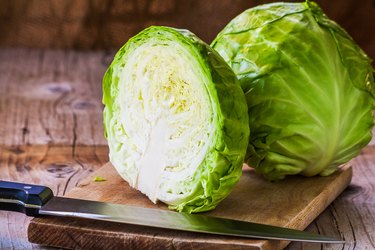
Constipation is an unpleasant but common affliction that can affect anyone, at any age. If you aren't experiencing regular bowel movements, or if you're not able to entirely empty your bowel, you may have constipation. In some cases, constipation lasts only for a short time, but in other cases, long-term or chronic constipation can cause pain. Eating a diet high in dietary fiber, found commonly in whole grains, fruits and vegetables, can help reduce your risk of developing constipation.
Dietary Fiber
Video of the Day
Dietary fiber comes from the indigestible portion of plants and is minimally broken down by your body. A diet high in dietary fiber can help treat or prevent constipation by adding bulk to your stools and helping keep them softer. Dietary fiber is found in many vegetables, as well as fruits, grains, legumes and nuts. The dietary reference intake of fiber for adult men is 38 grams per day, dropping to 30 grams for those 51 and older. For adult women, the recommended intake is 25 grams of dietary fiber per day, rising to 28 and 29 grams for those pregnant or lactating and dropping to 21 grams per day for those over the age of 51.
Video of the Day
Include Beans
All types of beans are rich in dietary fiber. A 1-cup serving of canned baked beans has 10.4 grams of dietary fiber per serving, while the U.S. Department of Agriculture lists boiled chickpeas as containing 12.5 grams of dietary fiber per 1-cup serving. A 1-cup serving of boiled black beans has even more dietary fiber per serving, containing a total of 15 grams.
Helpful Broccoli
Broccoli is rich in dietary fiber, too. A 1-cup serving of boiled broccoli has 5.1 grams of dietary fiber. A versatile vegetable to cook, broccoli lends itself well to baking, boiling, steaming or roasting. An equally sized serving of cooked broccoli vs. the raw version will have more dietary fiber per serving. A 1-cup serving of raw broccoli only has 2.4 grams of dietary fiber per serving.
Cabbage Relief
Cabbage is high in dietary fiber, although different types of cabbage contain different quantities of dietary fiber. Cooked green cabbage has the lowest amount of dietary fiber per serving, with only 2.8 grams of dietary fiber per 1-cup serving. In turn, cooked red cabbage has 3.9 grams of dietary fiber per serving, while cooked savoy cabbage has 4.1 grams of dietary fiber for the same sized portion. Raw cabbage -- for all three types -- contains less dietary fiber per serving than cooked cabbage does.
- U.S. Department of Agriculture: Broccoli, Cooked
- Children's Healthcare of Atlanta: Foods to Treat Constipation
- U.S. Department of Agriculture: Chickpeas, Cooked
- U.S. Department of Agriculture: Beans, Black, Cooked
- U.S. Department of Agriculture: Broccoli, Raw
- U.S. Department of Agriculture: Cabbage, Cooked
- U.S. Department of Agriculture: Cabbage, Red, Cooked
- U.S. Department of Agriculture: Cabbage, Savoy, Cooked